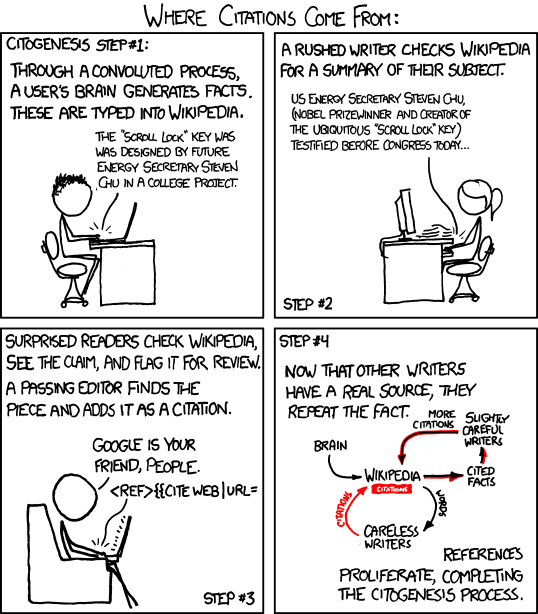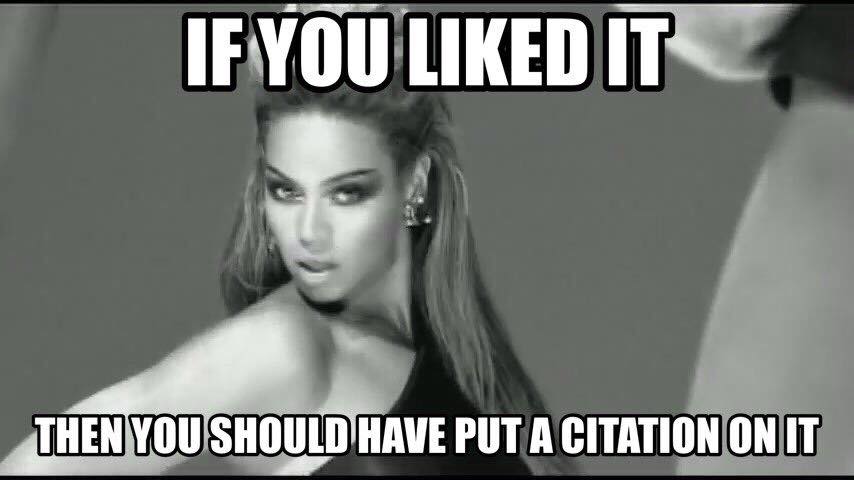Plagiarism will not be tolerated.

Wikipedian Protester by XKCD https://xkcd.com/285/
Every piece of work you hand in has your name on it and carries with it the presumption that you are the creator of the work. Therefore plagiarism is handing in work that isn’t (completely or partially) yours.
The best way to avoid plagiarism is to be careful with citing where your ideas come from. The following is taken from Dr Adrienne Shaw’s course website.
Citations have a few different main purposes.
First, citations give you the authority needed to make the claims you are making. How does your reader know that Gerard Goggin made the claim you say he did? Because you have given them the pages on which you think the claim was made and they can determine the accuracy of your interpretation themselves. How we you know that 69% of U.S. adults use social networking sites? Because you cited a reputable research organization who did the work to determine that. All scholars use citations to strengthen their claims, and you are expected to do the same.
Second, citations let your reader track down the sources you use. Because of this, they also allow you to track down the sources used by authors you are reading. If you read one journal article on Foursquare and social-locative media, for example, you can then track down all of the sources that the author cites for 5-30 more sources on the same topic. This will be particularly important as you work on your final project.
Third, citations are how you avoid plagiarism. Plagiarism is stealing someone else’s work. Plan and simple. In order to not steal their work, you must give them credit. Lots of citations do not diminish your work. Much the opposite. The more you cite the stronger your argument becomes. Note, however, that this does not mean you should rely on direct quotes constantly. You are expected to reinterpret authors as much as possible in your own words. Any ideas, quotations, or concepts that you learn about from sources should be cited, whether it is a direct quote or not. All claims you make must be grounded in scholarly sources. This is true of anything you use in your podcast as well. Any lecture you hear, book you read, article you draw on, or podcast you listen to should be cited in a list at the end of your assignments.
You need two types of citations for each assignment: in-text parenthetical citations AND a works cited list.
For parenthetical citations:
- Directly after the quoted, summarized, or paraphrased material, you should include a parenthetical citation formatted like this: (Christian, 2012, p. 90). This is the author’s last name, year of publication, and the page number of the material in question.
- Parenthetical citations should correspond to entries in the works cited list–so with the above example, your audience should be able to look at your works cited list and find the entry for Christian from 2012, which will give the reader the full citation for your source.
For a works cited list:
- At the end of every assignment, include a section titled “Works Cited.” This includes digital essays, project proposals, creative projects, and final papers.
- Enter ALL and ONLY the sources you mention in your assignment. Every single book, book chapter, film, YouTube video, website, journal article, image, lecture, etc. that you mention should have an entry.
- Works cited lists should be alphabetized by the author’s/creator’s last name. If there is no author/creator of a work that you can identify, the entry is alphabetized by the title of the work.
- Check out the APA citation guide here for information and examples of how to cite different types of sources (books, journal articles, films, websites, lectures, conference papers, book chapters, etc.).
- For YouTube specific citation help go here.
- For citing app help go here.
- For citing social media go here.
- For citing a variety of online sources, try here.
Why you shouldn’t use Wikipedia as a citation in your research papers:

Comic credit: Munroe, Randall. “978: Citogenesis” xkcd: http://xkcd.com/978/
Check out Fordham University Academic Integrity Statement.
The Academic Integrity Statement
As a student of Fordham University, I recognize that I am part of a community dedicated to the disciplined and rigorous pursuit of knowledge and communication of truth. I therefore commit myself to the University Code of Conduct and upholding the highest standards of academic integrity. Any work that I claim to be my own will be my own; I will give appropriate credit where credit is due; I will be fair and honest in all of my interactions with members of the Fordham community.
